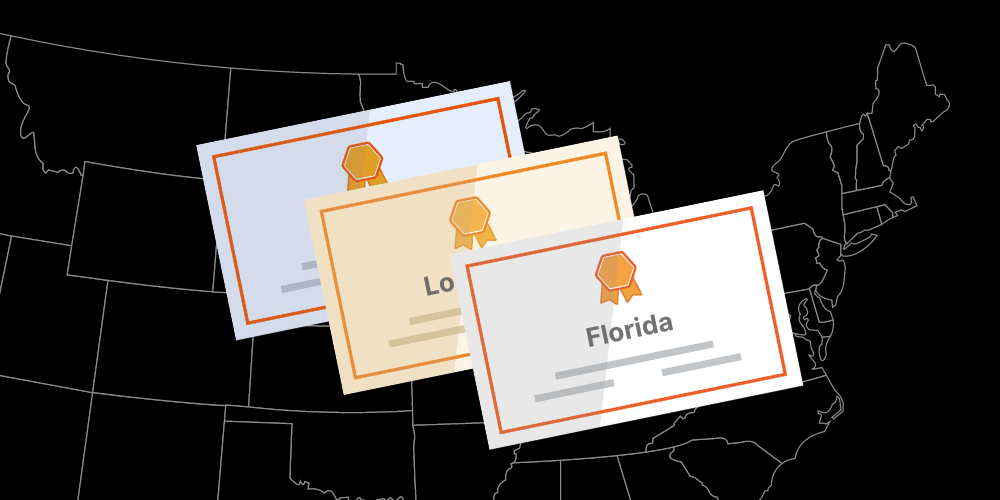— 5 min read
Vermont Contractor License: Guide to Rules & Requirements
Last Updated Jun 11, 2024
Last Updated Jun 11, 2024

If you're starting a construction business in Vermont or looking to expand your business from another state, being properly licensed to work is one of the first key steps. There are a variety of requirements for contractor licensing in Vermont depending on whether you're a general contractor or specialty contractor, what trades you work in, and what municipalities you plan to work in. Keep reading to find out what state and local licenses you may need to keep your business above board.
Planning on working in another state? Check out the Ultimate Guide to Contractor Licensing in Every State.
Table of contents
Who needs a contractor license in Vermont?
When it comes to general contractors, the State of Vermont doesn’t issue or require general contractors to carry a license. However, for some specialty trades like electrical and plumbing contractors, there are licensing requirements that they must meet.
And just because there aren’t state-issued licenses for general contractors and most sub-trades doesn’t mean that these contractors are off the hook. Some counties and municipalities might have their own requirements that contractors have to meet in order to work within their borders.
How to get a contractor license in Vermont
For the trades that require them, getting a contractor license in Vermont involves a combination of experience, examination, and a fair amount of paperwork.
Note: While the following licenses are required by the state, they aren’t technically contractor licenses — they’re trade licenses, and they’re required to perform the work involved in that trade. So while they’re not contractor licenses, they’re absolutely required to run certain contracting businesses in Vermont.
Plumbing contractors
Licensing for plumbing contractors in Vermont is a function of the Department of Public Safety Division of Fire Safety. This agency regulates all plumbing licenses, from apprenticeship through mastery.
Plumbing work in the state of Vermont must be performed under the supervision of a master plumber. This means that a plumbing contractor must either be a master plumber or employ someone who carries a master-level license.
To apply for a master or plumber license, the applicant will have to fill out this application and meet the following requirements:
- Hold a Vermont journeyman license for at least 12 months, or one of the following:
- Legal identifying information, including name, date of birth, Social Security information, and mailing address
- Employment information as it pertains to the licensing requirements
- References to qualifications
- Education information
- Experience
- Affidavit of Applicant, including signed and notarized application
- Answer compliance questions regarding background and child support
- Complete Employer Affidavit of Experience
- Pay the $120 initial application fee
Stay updated on what’s happening in construction.
Subscribe to Blueprint, Procore’s free construction newsletter, to get content from industry experts delivered straight to your inbox.

Electrical contractors
Like plumbing contractors, electrical contractors in Vermont need to pursue licensing through the Department of Public Safety Division of Fire Safety. This division handles all levels of electrical licensing.
Contractors performing electrical work in the State of Vermont must work under the supervision of a master-level electrician. The person who carries the license can be the company owner, a company officer, or an employee.
The process of getting a master-level electrician license is relatively straightforward. First, applicants will have to complete this application, and the requirements are:
- Hold a Vermont electrical journeyman license for two years, proving your qualifying experience, or one of the following:
- Legal identifying information, including name, date of birth, Social Security information, and mailing address
- Employment information as it pertains to the licensing requirements
- References to qualifications
- Education information
- Experience
- Affidavit of Applicant, including signed and notarized application
- Answer compliance questions regarding background and child support
- Complete Employer Affidavit of Experience
- Pay the $150 initial application fee, which is good for three years
How to get a Vermont contractor’s license at the local level
Some of the local cities and counties in Vermont might have their own contractor licensing requirements. These regulations can range from nothing at all to requiring the contractor to take an exam and register the business with the city.
The following are the most populated cities in the state, as well as their requirements for contractors.
Burlington
Contractors working in Burlington, Vermont, don’t have any specific hoops to jump through for licensing. The city prefers to leverage its building permits program in order to regulate contractors. As of May 2021, applicants can use the City of Burlington, VT, permit portal to apply for a permit online.
South Burlington
South Burlington, VT, contractors aren’t required to carry any special city-issued licenses. However, as the city relies on building permits for contractor regulation, all permit applications go through the South Burlington Fire Department. Applications for permits are available on the department website.
Rutland
When it comes to contractor licenses in Rutland, VT, things are pretty laid back. In fact, the city’s building permit requirements aren’t clearly laid out. For more information, it’s best to contact the building department directly.
Courses about construction.
For construction.
Unlock your career potential with our free educational courses on Health & Safety, Data in Construction, and more.
Penalties for unlicensed contracting in Vermont
The penalties for unlicensed contracting in Vermont are handled on a local basis. Just as each municipality has the right to develop its own licensing requirements, it has the right to develop its own penalties, as well.
However, the Division of Fire Safety does have fairly cut-and-dry rules about unlicensed contracting. The fine for performing electrical or plumbing work without a license will be no more than $500.
Additionally, Vermont’s mechanics lien laws make no specific requirements about licensing, meaning unlicensed contractors do potentially have lien rights. But just because you have lien rights doesn’t mean you should skirt the licensing process. Even if you're able to file a mechanics lien, if you move to enforce your lien in court, the court may not look favorably on your unlicensed status if you attempt to foreclose on someone’s property.
Was this article helpful?
Thank you for your submission.
67%
33%
You voted that this article was . Was this a mistake? If so, change your vote here.
Scroll less, learn more about construction.
Subscribe to The Blueprint, Procore’s construction newsletter, to get content from industry experts delivered straight to your inbox.
By clicking this button, you agree to our Privacy Notice and Terms of Service.
Categories:
Tags:
Written by
Tom Scalisi
57 articles
Tom Scalisi is a writer with over 15 years of experience in the trades. He is passionate about educating contractors and specialty contractors about the best practices in the industry. He has seen first-hand how education, communication, and preparation help construction professionals overcome challenges to build a strong career and thriving business in the industry.
View profileExplore more helpful resources

Contractor License Bonds: Everything You Need to Know
In order to perform construction work, many states require contractors to be “licensed and bonded.” What does that mean? Well, every state sets its own rules for contractor licensing, and...

Contractor’s Guide to License Reciprocity: Working Across State Lines
For many contractors, growing a construction business means taking on jobs in different states. Whether it’s to take a one-off project or to establish a new business location, working in...

The Maine Contractor License: Guide to Rules & Requirements
If you’re considering starting a contracting business in Maine, it’s important to know the rules and requirements for proper licensing. Maine takes a different approach to contractor licensing than most...

The South Dakota Contractor License: Guide to Registration & Requirements
If you’re starting a construction business in South Dakota — or expanding there from another state — a key first step is knowing the rules and requirements around proper contractor...